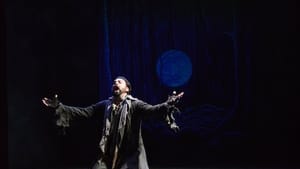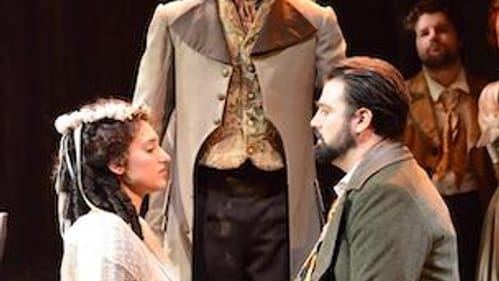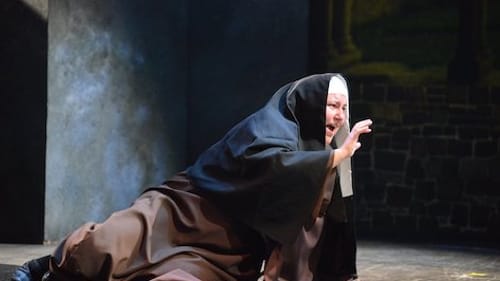Stay in the Loop
BSR publishes on a weekly schedule, with an email newsletter every Wednesday and Thursday morning. There’s no paywall, and subscribing is always free.
A lover spurned
Academy of Vocal Arts presents Puccini's 'Suor Angelica' and 'Le Villi'

Halloween may have passed, but a good ghost story never goes out of style. That proved the takeaway on opening night at the Academy of Vocal Arts (AVA), which started its opera season with the rarely heard Puccini thriller Le Villi. The one-act was paired with the more familiar Suor Angelica, usually the centerpiece of the popular triple bill Il Trittico.
Le Villi, which Puccini composed at the dawn of his mature career in 1884, blends Italian verismo with Bavarian folklore. When hunter Roberto falls under a siren’s spell and abandons his fiancée Anna, she dies of a broken heart. Her spirit joins the titular villi, a band of fairies who haunt the Black Forest, seeking revenge on their faithless lovers by beckoning them to a dance of death.
Perfect fit
David Gately’s production, with woodsy projections by Allen G. Doak Jr. and elegant period costumes by Val Starr, played up the story’s rustic fairytale setting. The action seamlessly transitioned from the hopeful, romantic promise of Roberto and Anna’s betrothal to the chilling otherworldliness of their postmortem pas de deux.
Although written nearly two decades before popular successes like La Boheme and Tosca, Puccini’s score contains echoes of earworms to come. AVA’s orchestra blossomed under the baton of Richard A. Raub, with lushly textured strings and whistling woodwinds underlining a Germanic influence. Raub’s reading offered some of the cleanest playing I’ve heard from this pit band in years.
Ardent tenor Mackenzie Gotcher thrilled as Roberto, his throbbing sound easily cutting through Puccini’s dense orchestrations. (Abraham Breton and Matthew White will sing the role at later performances). He occasionally put too much pressure on high notes, causing them to sputter out rather than fully bloom. But the overall effect was exciting, nicely complementing his dashing stage presence.
Similarly, Rebecca Gulinello’s soft-grained soprano sometimes sounded overparted in the daunting role of Anna, particularly at the upper and lower ends of her range. But her lyric voice possesses a youthful, finely spun quality that suits the role. Her transformation from love-besotted juvenile — exemplified in the gorgeous aria “Se come voi piccina,” the opera’s one enduring standard — to vengeful apparition was utterly convincing.

Baritone Ethan Simpson’s smooth, limpid tone made him an impressive Guglielmo, Anna’s father, surmounting an overabundance of old-age makeup. But even a silly stylistic decision like that couldn’t dampen the pleasure in the performance of this lovely, little-heard work. Presenting operas like Le Villi that are unlikely to be staged anywhere else strikes me as exactly what a conservatory should be doing.
Technical difficulties
Suor Angelica will be heard elsewhere, and soon — the Metropolitan Opera begins performances later this month, to honor the 100th anniversary of Il Trittico’s premiere. And surely that staging will exceed AVA’s rather tepid assumption, which seemed both musically and dramatically underwhelming on opening night.
Claire de Monteil sang prettily in the title role, a noblewoman forced into a convent as penance for bearing an illegitimate son. But her largely affectless performance captured neither the character’s pathos nor her anguish. She smiled broadly at the audience, even in her character’s most pained moments — as when she learns that her son, raised by family members in her absence, has been dead for years.
First-year mezzo Alice Chung displayed a promising instrument as La Zia Principessa, Angelica’s forbidding aunt, although her sound turned hollow in the middle range. Her acting consisted mostly of stock gestures, resulting in a rather anticlimactic showdown between the two women. A melodramatic work like Suor Angelica doesn’t require brilliance of technique, but Gately could have worked harder to draw out the complicated relationship at the story’s heart.

Instead, he focused on inserting baffling extranarrative devices, like opening the opera with a gaggle of injured soldiers cared for by the cloistered nuns. Their presence adds nothing, and the choice feels questionable in a work deliberately designed to highlight female experiences.
Doak’s projections malfunctioned on opening night, causing a blank desktop screen to flash onto the back wall of the Helen Corning Warden Theater. The snafu elicited a wave of laughter from the audience — a gentle reminder that technology isn’t always an artist’s friend.
Christofer Macatsoris’s leadership of the orchestra proved even more distressing, though. As is his unfortunate custom, he shouted commands to individual players, the sound reverberating throughout the auditorium. But little good came of his verboseness. Flatness in the strings, smudgy transitions, and late entrances persisted, reducing Puccini’s haunting score to a tinny mess.
The difference in musical distinction between Le Villi and Suor Angelica was truly shocking. I hope the orchestra will improve in the later work throughout the opera’s run, which includes several Pennsylvania tour stops this month. But above all, listeners should take the chance to savor a worthy rarity from an Italian master.
What, When, Where
Suor Angelica and Le Villi. By Giacomo Puccini, David Gately directed. Academy of Vocal Arts. November 6-8, 2018, at the Helen Corning Warden Theater, 1920 Spruce Street, Philadelphia. (215) 735-1685 or avaopera.org.
November 10, 2018, at Tohickon Middle School, 5051 Old Easton Road, Doylestown, Pennsylvania.
November 18, 2018, at Lehigh University's Zoellner Arts Center, 420 E. Packer Avenue, Bethlehem, Pennsylvania.
November 27, 2018, at the Haverford School's Centennial Hall, 450 Lancaster Avenue, Haverford, Pennsylvania.
Sign up for our newsletter
All of the week's new articles, all in one place. Sign up for the free weekly BSR newsletters, and don't miss a conversation.

 Cameron Kelsall
Cameron Kelsall